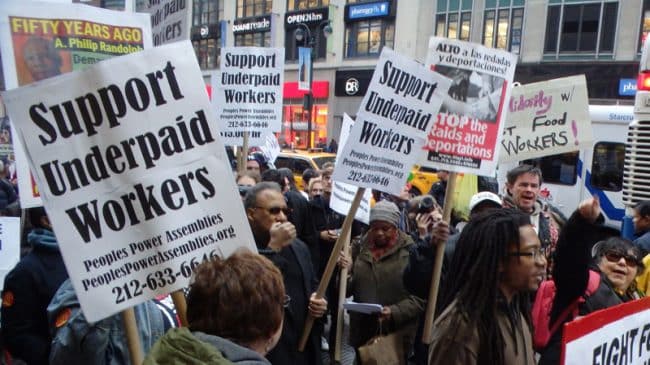President Obama recently urged Congress to “give America a raise” by increasing the federal minimum wage from $7.25 to $10.10 an hour. His appeal comes just months after Gov. Jerry Brown signed a bill that will raise California’s minimum wage from $8 to $9 an hour this July and to $10 an hour in 2016. And at least two more minimum wage increase proposals are currently being promoted statewide which, if passed, will end up hurting small businesses in California and won’t create full-time jobs.
Members of the Los Angeles City Council plan to introduce a proposal to raise the minimum wage for non-unionized city hotel workers to $15.37 an hour. The exemption for unionized hotels has raised questions about whether the goal is higher wages or more unionized hotels, but Mayor Eric Garcetti vowed, “If it gets passed by the council, I would definitely sign it.”
At the same time, activist and entrepreneur Ron Unz is championing a proposal that would increase the state minimum wage to $10 an hour in 2015 and to $12 an hour in 2016. While Unz may agree with supporters of the L.A. hotel proposal who argue that raising the minimum wage will lift people out of poverty, he’s actually seeking to raise the minimum wage in hopes of deterring illegal immigration.
“The overwhelming majority of illegal immigrants come for jobs and they take the jobs that Americans won’t. But the reason Americans won’t take them is that the wages are too low, and the only people willing to work at poverty wages are often recent, desperate border-crossers,” Unz recently wrote in the Mercury News. “If the minimum wage were $12 per hour, many Americans and legal immigrants would apply for those positions, reducing the pressure on businesses to hire the undocumented.”
Regardless of the differing motivations for increasing the minimum wage, the bottom line is both plans would be bad for California’s low-income workers and businesses.
City and state-imposed minimum wages put businesses in those areas at a competitive disadvantage. Labor-intensive businesses in states with higher minimum wages struggle to compete with similar companies in lower minimum wage states. Escalating wage costs can drive these firms out of business altogether or force them to relocate to states like Texas, where the minimum wage is $7.25.
In December, the unemployment rate in Texas was 6 percent, below the national average of 6.7 percent. In California it was 8.7 percent. Texas also topped California in total job growth last year. New jobs are created by fast-growing businesses. Laws that increase labor costs hamper growth. In many cases, small businesses, which comprise 99 percent of California’s employers and employ 52 percent of the state’s workforce, are ill equipped to bear the costs of higher priced labor. For those small businesses, the cost difference between hiring a new employee at $7.25 per hour versus adding one at $10, $12 or $15 an hour is immense.
It’s also worth noting that if any new jobs were to be created as a result of further increases to California’s minimum wage, they’d likely be part-time positions. Two-thirds of today’s minimum wage jobs are part-time, and part-time labor is already outpacing full-time labor in terms of growth and the total percentage of the labor force. As the sluggish economic recovery continued in 2013, 77 percent of jobs created were part-time. Raising the minimum wage will only further that trend because when the price of labor goes up, hiring part-time workers is more cost-effective.
California’s economy has been improving, but businesses will suffer when the state’s minimum wage increases in July. The latest minimum wage proposals may be creatively aimed at nonunionized hotels and immigration, but the end result would still likely be fewer entry-level job opportunities, layoffs and reduced hiring that hurts the economic recovery.
Victor Nava is a policy analyst at the Reason Foundation.This article originally ran in the Orange County Register.
